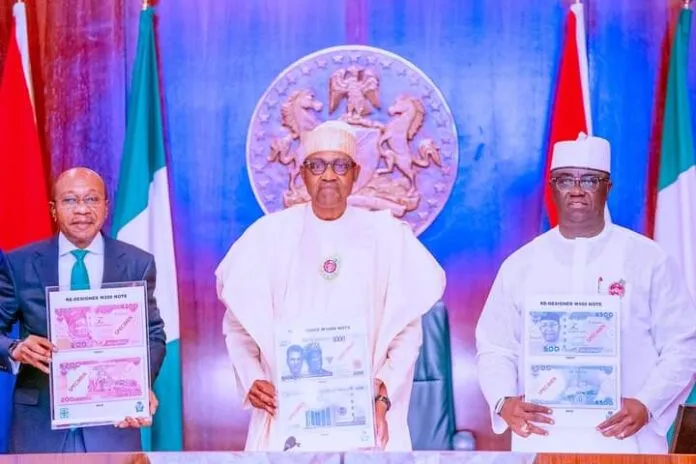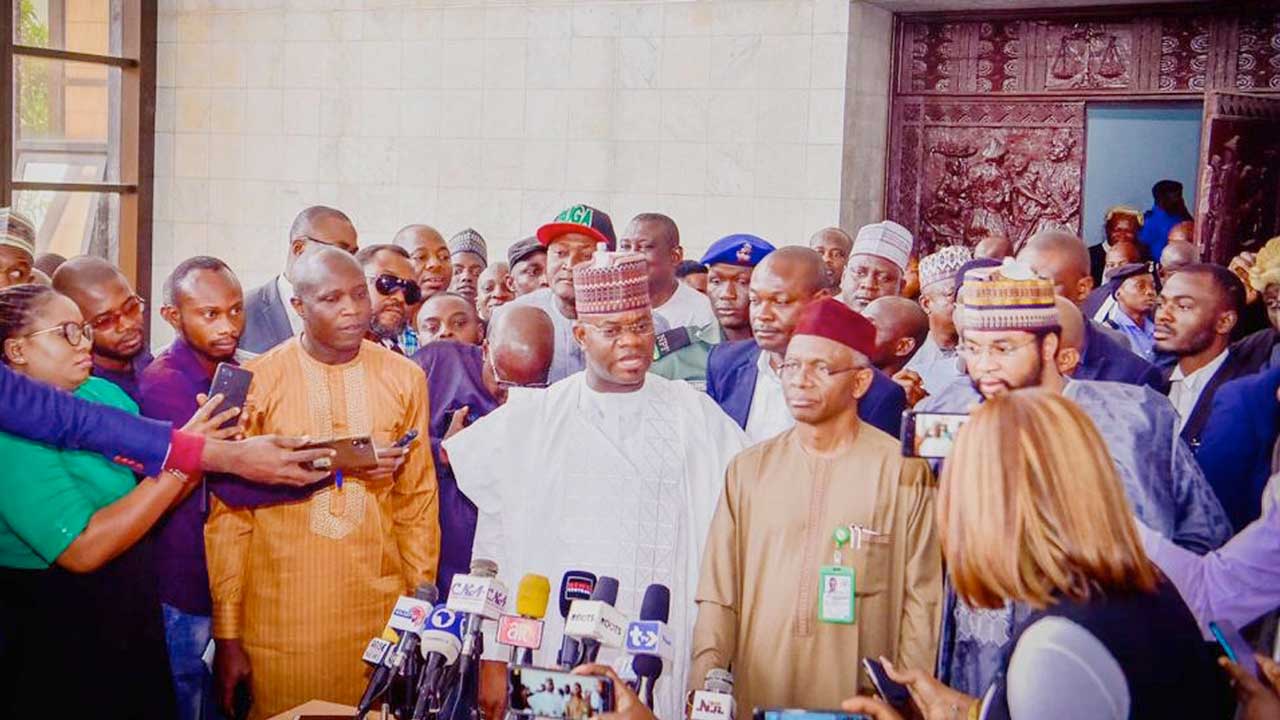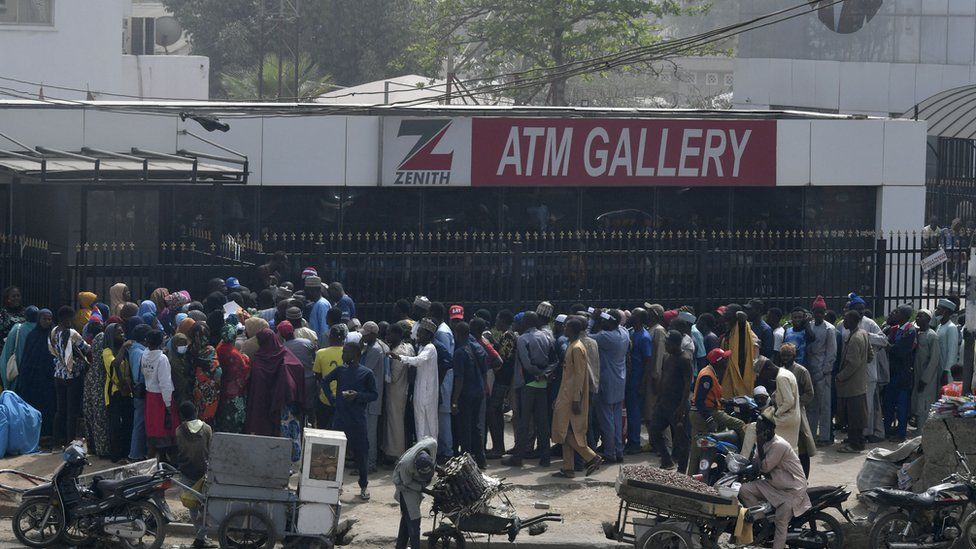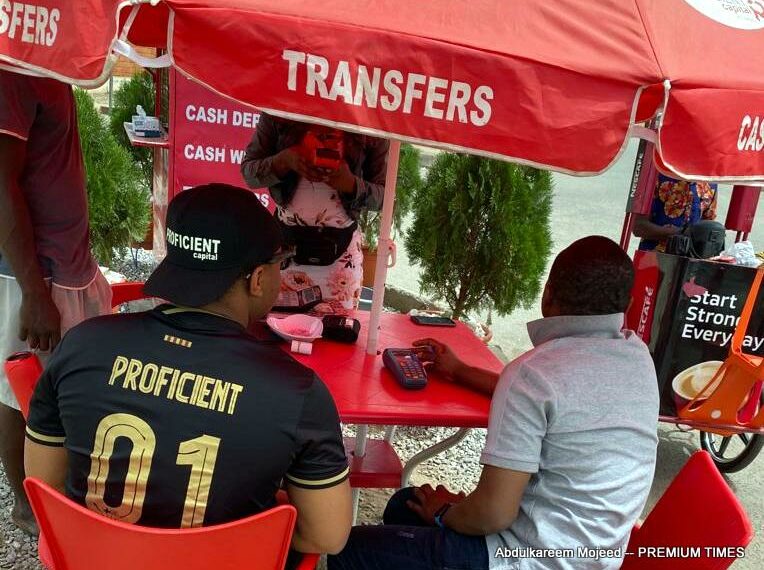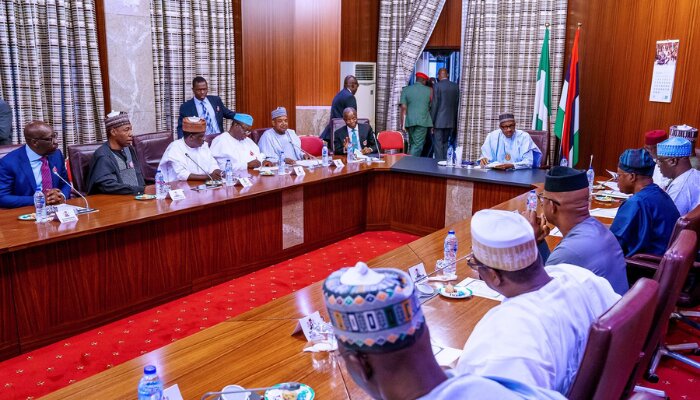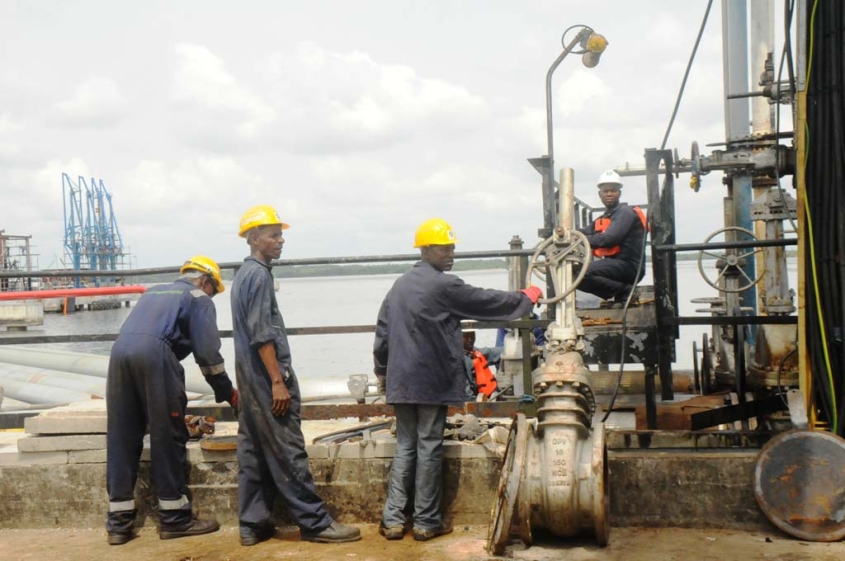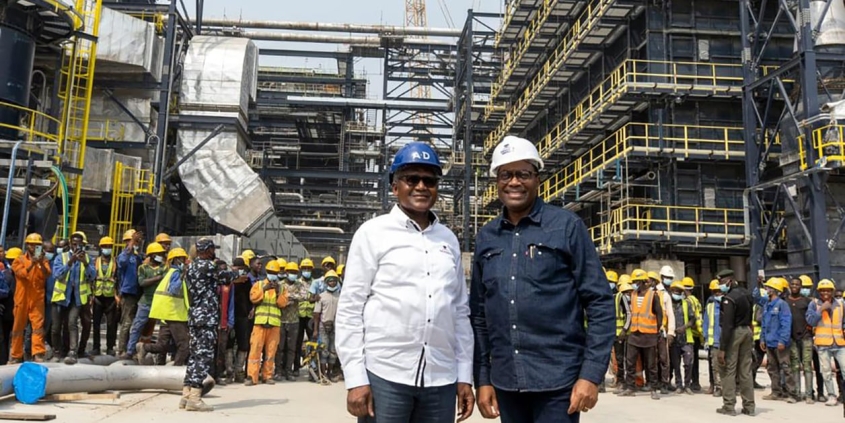Nigeria Chooses – A Snapshot of the Federal Elections to Date
Introduction and Background
Following what was probably the most contested presidential election in Nigeria’s history, and an election process that according to many observers and commentators was deeply flawed, in the early hours of Wednesday, 01 March 2023, the Independent National Electoral Commission (INEC) announced that the candidate for the ruling All Progressive Congress (APC), Asiwaju Bola Ahmed Tinubu, had won the election for the Presidency and was the new President Elect.
His victory was the result of a deeply split opposition. According to the BBC, the combined votes of his three closest rivals – one member and two former members of PDP – amounted to 60% of the vote. Had they been contesting on a unified ticket the APC would have been ousted from the Presidency. The PDP’s Atiku Abubakar won 29% of votes cast, the Labour Party’s Peter Obi 25% and Rabiu Kwankwaso of the NNPP 6%. Tinubu won with just 37% of votes cast.
Of key note, and a possible indication of future political change in the country, for the first time a third candidate became a serious contender. The rise of Peter Obi has been meteoric, despite a poor resource base and a weakly organised campaign. Observers have contrasted Tinubu with Obi, an energetic and frugal 62-year-old businessman, who reached across the country’s social and political fault lines to woo voters from all communities and ran a slick social media campaign to attract the young.
Significantly, Obi won a total of 6.1m votes, winning in both Lagos, Nigeria’s biggest city and commercial powerhouse, and the federal capital, Abuja. His success in attracting a significant percentage of votes cast should serve as a warning to the ruling APC and the new President that the people, particularly the youths and young professionals, want change.
In what may have been seen as an unusual move, Tinubu, a southern Muslim, instead of choosing a running mate from one of the Christian minorities in the north, picked a northern Muslim. He took a risk in order to avoid alienating the huge Muslim voting bloc in the north – though in doing so he risked irritating most of the country’s Christians by having a Muslim-Muslim ticket.
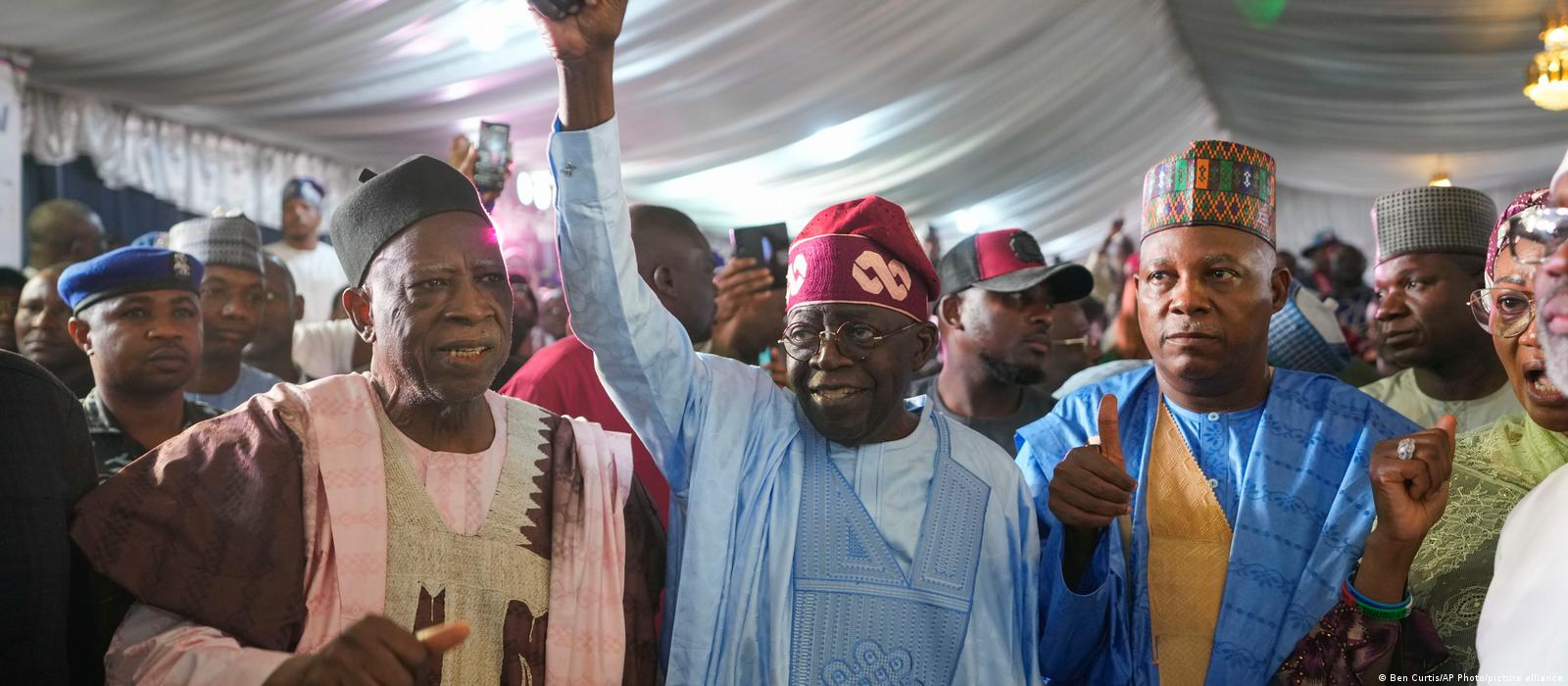
Tinubu’s Manifesto
So, what has Tinubu promised in his manifesto and will it be enough to address the ever-present sectarian tensions in the country?
Historically Tinubu has a track record of addressing major challenges from his time as Governor of Lagos State, where he tackled rampant criminality and gridlocked traffic congestion. But questions remain over what he can/will deliver on a national level.
During the election the President-elect built his platform on three major pillars, vowing to focus on escalating and expanding violence, double-digit inflation and the seemingly intractable challenge of industrial-scale oil theft. He has also stated that he aims to deliver the following:
Social and Economic Development
- A robust public infrastructure programme to create jobs.
- Removal of legal limits on government spending.
- Reduction of corporate tax to attract investment.
- Plugging tax loopholes to boost revenue.
- The phasing out of the fuel subsidy, which cost $10 billion last year and is driving up debt. The taxes raised will be used to fund the infrastructure projects referred to above as well as agriculture and social welfare.
- Reform of the existing system of multiple foreign exchange rates. The International Monetary Fund says the system is subject to abuse and makes it difficult for investors to repatriate their money driving away necessary FDI.
- Using any new borrowing to fund projects that generate revenue from which debt can be repaid.
Reform of the Oil Sector
- Establishment of a dedicated surveillance unit to protect the country’s pipelines.
- Development of tax incentives to attract new investors.
- Refurbishment and development of Nigeria’s refining sector to reduce the country’s dependence on imported refined product.
Internal Security Challenges
- Recruitment and training of more military and police personnel.
- Improving the pay and equipping of the security forces.
- Creation of dedicated “anti-terrorist battalions” and special forces to fight jihadists and armed gangs.
- Involvement of the military in community initiatives to “win hearts and minds.”
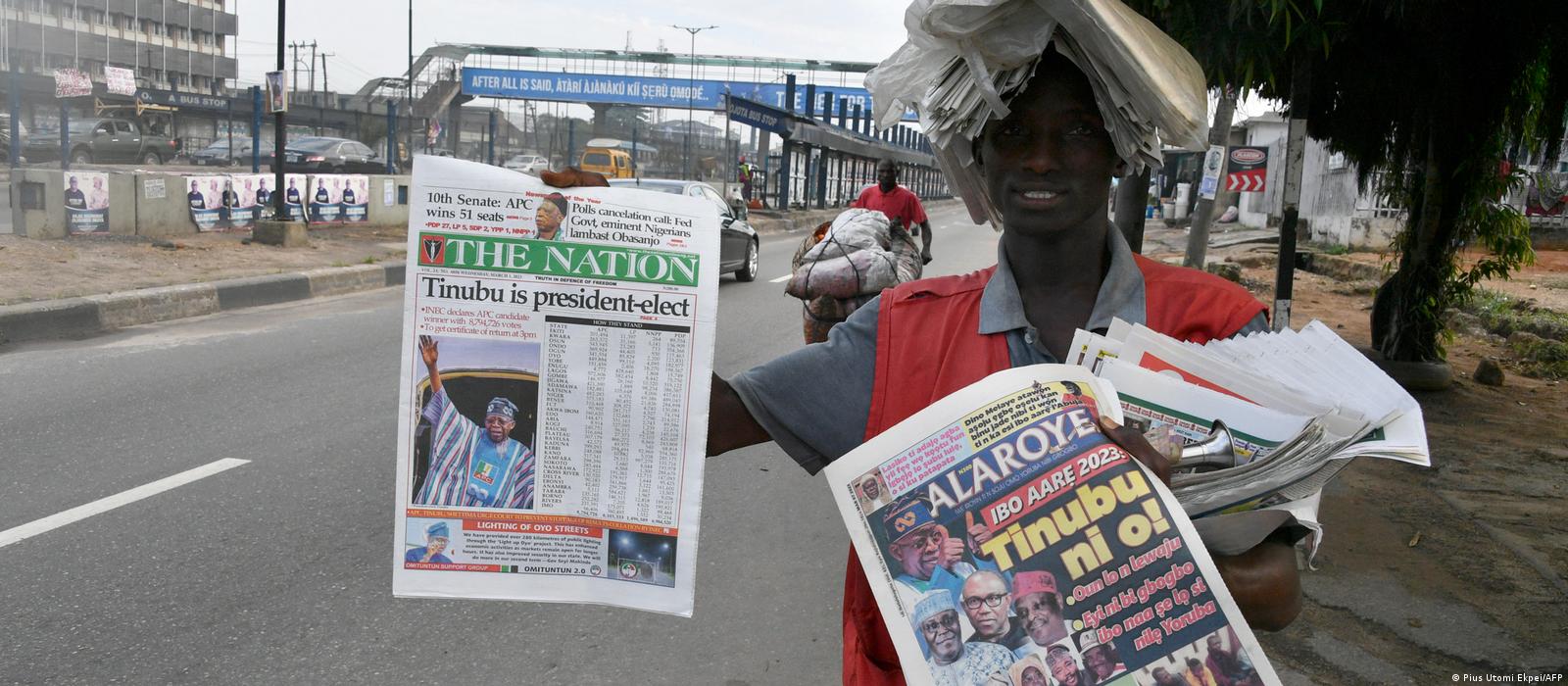
Was the Election Conducted Properly?
Nigeria needed a clean election to underline the basic premise that the country is a modern democracy and that the people can choose their leaders. Sadly, some reports show some aspects of the election may have been badly mismanaged.
The emergence of Peter Obi as a viable third-party candidate brought excitement and forced all candidates to deliver a credible manifesto based on actual policies.
Observers assessed the Independent National Electoral Commission (INEC) was in good shape, having high expectations that INEC’s promise to transmit voting tallies electronically from polling stations would be met and eliminate the potential for ballot stuffing.
According to some analysts, INEC stumbled badly, with voting starting late in many districts, potentially depriving millions of the right to vote. The system to remotely upload results from 177,000 polling stations failed in many places, causing legitimate concerns about vote tampering during the numerous long delays – some of which seemed contrived.
Violence during the election was also widespread, but relatively isolated. However, Rivers State and parts of Lagos State saw significant political violence on both days that polling took place. A report in the Financial Times claimed they had witnessed armed men remove a presidential ballot box in Surulere, Lagos. INEC announced the results early on Wednesday, but some individual results appear suspect, including that of Peter Obi’s narrow victory in Lagos state.
Observers and commentators noted several concerns relating to the conduct of the polls, including:
- Long delays in the opening of polling centres causing many voters to lose the opportunity to cast their votes. In some polling units with thousands of registered voters, voting allegedly did not commence until 13:00 – one-and-a-half hours before polls were due to close. Despite the extension of the opening of such centres, many were unable to vote when darkness fell and security forces left, forcing the polling centres to close.
- Reports in Lagos of some polling officers failing to arrive at all at polling centres.
- At some voting centres, particularly in opposition strongholds, it is alleged that voting did not in fact take place.
- Numerous cases, some supported by video evidence, of ballot-box snatching, violence and voter intimidation have been reported. This was particularly prevalent in states in the south such as Rivers, Lagos and Delta.
- Election monitoring group Yiaga, said only 10% of polling units in the south-east and 29% in the south had started accreditation and voting by 09:30 local time on Saturday – an hour after polls opened. Conversely, in the APC heartlands, 63% of polling units in the south-west and 42% of polling units in the north-west, known APC strongholds, had started voting at that time.
- International observer missions from the NDI-IRI (The International Republican Institute (IRI) and National Democratic Institute (NDI) Joint Election Observation Mission (IEOM)) and the EU have described the process as lacking transparency. A team of observers led by Joyce Banda, the former president of Malawi, said delays on voting day, which led to many polling stations opening hours late, meant the election “fell well short of Nigerian citizens’ reasonable expectations”. An EU mission said the failures “reduced trust in the process and challenged the right to vote”. You can read the preliminary statements here and here.
Dismissing these observation on Wednesday, Tinubu said, “the lapses that were reported, they were relatively few in number and were immaterial to affect the final outcome of the election.”
Perhaps of greater concern when considering the political mandate of the new President is that official INEC figures for voter turnout was particularly low, reaching only 27%, which means two-thirds of the 87mn people who lined up for hours to collect their voter registration cards subsequently failed to cast their ballot.
This cannot simply be explained away as voter apathy and the possibility of widespread voter intimidation, suppression, and ballot theft cannot be ruled out. With just 25 million votes being cast in a country with a population of 220 million (Tinubu won just 8.8 million votes), the new President will almost certainly need to address the political malaise if he wishes to run again in 2027 and any second term is to have legitimacy.
Both Peter Obi of the Labour Party and the People’s Democratic Party’s Atiku Abubakar have made claims that the election was rigged in some states and polling areas. They have to decide whether to launch legal challenges to the result, they have 21 days following the result to do so, but statements from both in the 48hrs after the result was announced seem to indicate this is a possibility. The election “was grossly flawed in every material particular and as such, must be challenged by all of us”, Mr Abubakar said on Thursday, adding that he was consulting his lawyers.
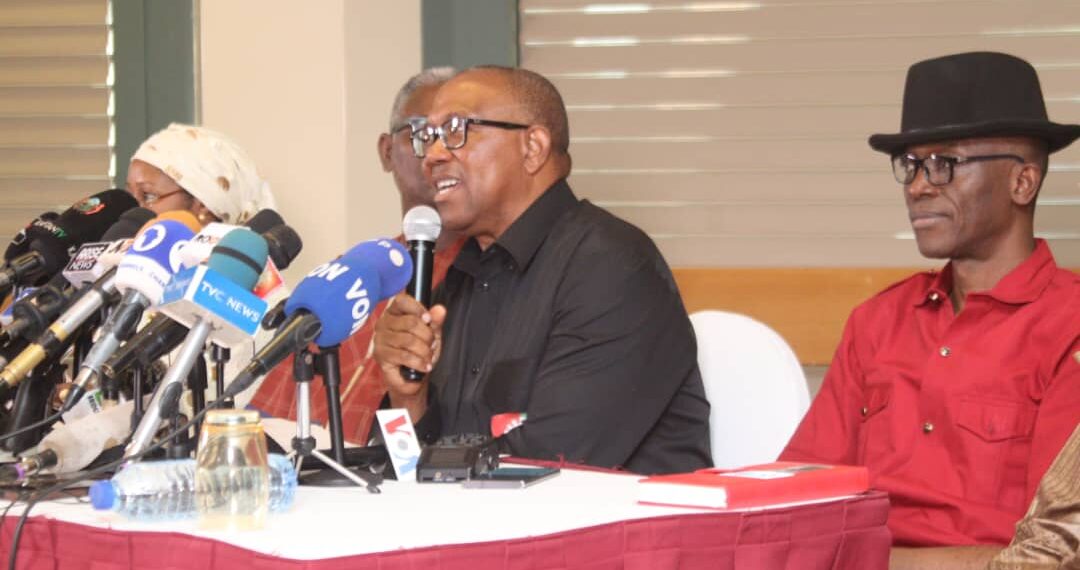
Earlier in the day, Mr Obi said Saturday’s elections would go down as “one of the most controversial elections in Nigeria’s history”.
“The good and hard-working people of Nigeria have again been robbed by our supposed leaders whom they trusted,” he told journalists. It is notable that courts in both Kenya (2017) and Malawi (2020) overturned election results deemed to be suspect. If the losing candidates launch a legal challenge, the courts in Nigeria face a challenging situation that will embroil them in what will likely become a vigorously fought political and legal contest. In reality, it is unlikely that the Nigerian courts will overturn the election result.
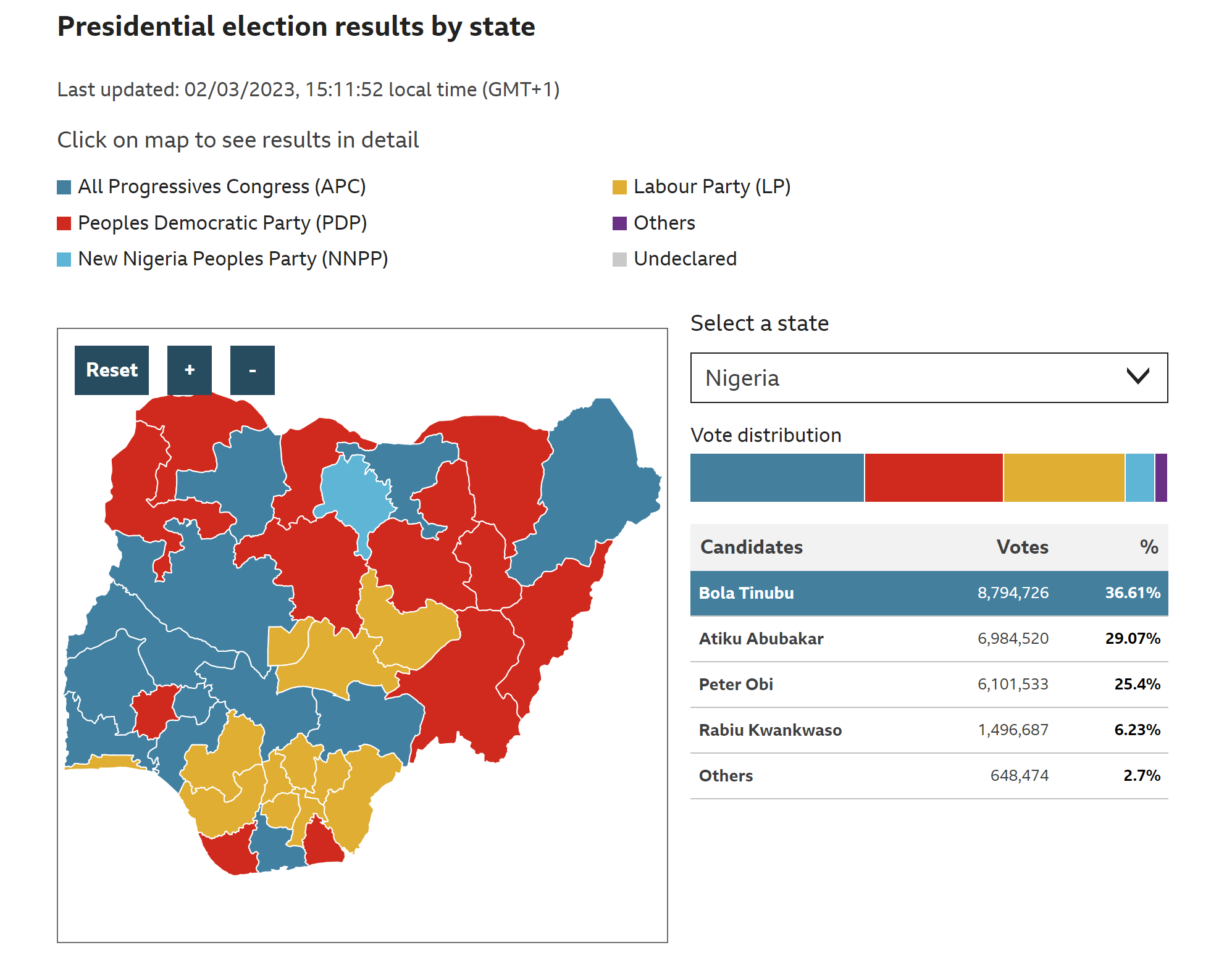
Image credit: https://www.bbc.co.uk/news/world-africa-64808775
What Next?
In a series of post-election speeches, Tinubu sought to play down the problems reported by observers relating to the credibility of the election and to avert post-poll violence. He addressed his competitors and their supporters in conciliatory terms and called for unity of nation and of purpose. He said; “I take this opportunity to appeal to my fellow contestants to let us team up together,” the 70-year-old veteran said in a speech broadcast live on television. “It is the only nation we have. It is one country and we must build together.”
Several hours later, he addressed those who voted for other candidates, saying; “I understand your hurt. To you, I extend the embrace and comfort of a family member. This great project called Nigeria beckons to us all. It is bigger and more important than any partisan divide.”
His words are an important call for calm and unity. Nigeria sits of a knife edge, with widespread internal security challenges, rampant organised crime, serious inter-communal violence in some parts of the country along with deepening poverty and hardship for most Nigerians. The economy has stalled and foreign currency reserves are almost completely depleted. In a country with burgeoning population growth, change and reform will be a priority for the President.
Reform of the security forces is also essential if Nigeria is to move forward. It is hoped that these reforms will address the fundamental problems of poor pay and poor equipment and logistics that hamstring security forces operations.
The Muslim-Muslim ticket will additionally have exacerbated tensions among Christians throughout the country. This issue has the potential to generate flash points, particularly in the mid-belt states where sectarian fault lines run through hundreds of communities. This was illustrated starkly following the 2011 election – most sharply in Kaduna, where a wave of sectarian violence left hundreds dead.
Finally human rights in Nigeria are under the microscope. It remains uncertain how important these issues are to the President-elect after his comments following the shooting of numerous protestors at the Lekki Toll Gate during the #ENDSARS protests in late 2021 (read a report from the time here)
On the political front, the country now moves into the next round of elections in which voters will elect state governors and local council leaders. Historically, these elections have been more violent and more heavily disrupted than those at the federal level. With the main opposition parties levelling allegation that the federal elections were flawed and calling for them to be scrapped, it is possible that the state elections will be fought very vigorously. Hot spots are likely in Rivers and Lagos States as well as the predominantly Igbo populated and largely PDP supporting states of the South East region”. The US on Thursday called on the INEC to address the technical issues faced in the Presidential election prior to the next round of elections (read the details here)
Arete will continue to monitor this developing situation and provide updates accordingly, including the run up to the governorship and state elections on 11th March.

